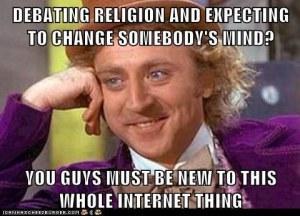 Because I enjoy watching Bible-related videos, particularly those which discuss topics of Biblical archeology and apologetics, my Youtube “recommended” list is now completely inundated with clips showing debates between Christians and atheists. Like a boxing poster announcing an upcoming heavyweight title bout, the thumbnails for these videos show two opponents, typically in very profound poses suggesting that they are locked in deep thought (see the picture at the right as an example), complete with their names, and sometimes credentials, listed above their photo with the letters “vs.” between them.
Because I enjoy watching Bible-related videos, particularly those which discuss topics of Biblical archeology and apologetics, my Youtube “recommended” list is now completely inundated with clips showing debates between Christians and atheists. Like a boxing poster announcing an upcoming heavyweight title bout, the thumbnails for these videos show two opponents, typically in very profound poses suggesting that they are locked in deep thought (see the picture at the right as an example), complete with their names, and sometimes credentials, listed above their photo with the letters “vs.” between them.
Without a doubt, the subjects of religion and the supernatural are as popular as ever and many of these videos have received literally millions of views. Books such as Richard Dawkins’ “The God Delusion“, Sam Harris’ “Letter To A Christian Nation“, and Christopher Hitchens’ “God Is Not Great” have been wildly popular bestsellers and have ushered in a new era of “Reason” in the first two decades of the 21st Century, commonly referred to as the “New Atheism.”
Christianity, and in fact all other deistic religions, have come under direct attack by the “New Atheists” whose agenda is the triumph of scientifically based empiricism over religious belief in a Divine Creator. What the ultimate goal actually is seems to vary from one proponent of the New Atheism to the next, and even depends on the context in which they are asked and by whom. Some seem to endorse the complete and total eradication of religious faith altogether while others are content to allow people of faith to live in peace, so long as they remain silent about their beliefs and abstain from voting or governing according to their faith-based morals.
 The thrust of the New Atheists’ attacks against Christianity can be categorized as follows: 1.) Attacks on the consistency and credibility of the Bible – whether it is alleged errors and contradictions in the text of the Bible or the “unintellectual” propositions of the miraculous (come on, a talking snake, really?), the atheists feel that if they can call into question the Bible’s veracity then they can persuade Christians to reject and abandon it. 2.) Ad hominem attacks – while I must admit after watching many of these debate videos that most of the “professional” atheists conduct themselves with decorum and civility, there is always a tone of condescension and the constant inference that people of faith are ignorant and unintellectual (Michael Shermer, founder of the Skeptics Society, is a rare exception from what I have seen of him, and is particularly impressive in his ability to clearly and articulately present his ideas respectfully). Once you begin to read the comments section below the videos, however, you quickly begin to see remarks littered with profanity, name-calling, and blasphemy among the common, everyday fans of the New Atheists. So whether the atheist is a trained orator or not, it seems that, when backed into a corner, the go-to response is simply, “I’m the intellectual one here, you Christians are just willfully ignorant and your beliefs are stupid!”
The thrust of the New Atheists’ attacks against Christianity can be categorized as follows: 1.) Attacks on the consistency and credibility of the Bible – whether it is alleged errors and contradictions in the text of the Bible or the “unintellectual” propositions of the miraculous (come on, a talking snake, really?), the atheists feel that if they can call into question the Bible’s veracity then they can persuade Christians to reject and abandon it. 2.) Ad hominem attacks – while I must admit after watching many of these debate videos that most of the “professional” atheists conduct themselves with decorum and civility, there is always a tone of condescension and the constant inference that people of faith are ignorant and unintellectual (Michael Shermer, founder of the Skeptics Society, is a rare exception from what I have seen of him, and is particularly impressive in his ability to clearly and articulately present his ideas respectfully). Once you begin to read the comments section below the videos, however, you quickly begin to see remarks littered with profanity, name-calling, and blasphemy among the common, everyday fans of the New Atheists. So whether the atheist is a trained orator or not, it seems that, when backed into a corner, the go-to response is simply, “I’m the intellectual one here, you Christians are just willfully ignorant and your beliefs are stupid!”
And finally, 3.) Demands for evidence – it is this area that I want to look at more closely. If the New Atheists have a mantra its this: “Prove It.” Where is the proof?, they ask. Christians make a claim that God exists. The skeptic asks for proof. The Christian cannot provide it. Game, set, match atheists. Checkmate. Christopher Hitchens, one of the so-called “Four Horsemen of the New Atheism” (pictured above), has popularized the axiom bearing his name (Hitchens’ Razor),
“What can be asserted without evidence can be dismissed without evidence.”
 It is upon this hinge that most of these debates hang. Some Christian scholars and theologians have responded to the New Atheists’ challenge and have set about to prove the existence of God, sometimes empirically (through reference to the complexity of the world around us), but more often through arguments of logic (William Lane Craig, pictured above, seems to be the Christians’ champion at this craft). And while I applaud the efforts of those who have stepped up to try and beat the New Atheists at their own game, I wonder if perhaps this is not the best approach. In all honesty, the transcript of most of these debates amounts to little more than the atheist saying, “Prove God exists” and the Christian responding, “You prove that He does not.” Predictably, each side offers up their best reasonings and analogies, which the other side of course rejects as invalid, and everyone (including the audience) goes home believing pretty much the same thing as they did when they arrived.
It is upon this hinge that most of these debates hang. Some Christian scholars and theologians have responded to the New Atheists’ challenge and have set about to prove the existence of God, sometimes empirically (through reference to the complexity of the world around us), but more often through arguments of logic (William Lane Craig, pictured above, seems to be the Christians’ champion at this craft). And while I applaud the efforts of those who have stepped up to try and beat the New Atheists at their own game, I wonder if perhaps this is not the best approach. In all honesty, the transcript of most of these debates amounts to little more than the atheist saying, “Prove God exists” and the Christian responding, “You prove that He does not.” Predictably, each side offers up their best reasonings and analogies, which the other side of course rejects as invalid, and everyone (including the audience) goes home believing pretty much the same thing as they did when they arrived.
Now, I want to be very careful in what I say, I am not attempting to criticize the efforts of Christians such as Dr. Craig who feel that debating these individuals is a worthwhile pursuit. If such debates can spark the interest in a non-Christian viewer to seriously investigate the claims of Christianity, then it is fruitful indeed. But I suspect that this would be a very rare occurrence. My interest, as always, is to consider what the Bible has to say about the whole nature of this subject.
With this in mind, I believe that the Bible gives some bad news for both the atheist and the Christian debaters. The atheist asserts that no evidence exists while the Christian asserts that it does exist and thus the debate revolves around these two positions. But what if we are asking the wrong questions and giving the wrong answers entirely? In other words, what if empirical, scientifically observable evidence is not even the right approach to finding out whether God exists?
“For the wrath of God is revealed from heaven against all ungodliness and unrighteousness of men, who by their unrighteousness suppress the truth. For what can be known about God is plain to them, because God has shown it to them. For his invisible attributes, namely, his eternal power and divine nature, have been clearly perceived, ever since the creation of the world, in the things that have been made. So they are without excuse.” (Romans 1:18-20)
 First of all, evidence does exist for the existence of God, many people have simply chosen to suppress it in their own hearts and minds. To observe the world around us, the mind-boggling complexity and order in the Universe, and conclude that it has all arisen through random chance is certainly not the most obvious conclusion to reach. It takes a decision of the will to suppress the testimony of nature and assert that such is the result of directionless forces. To surmise, as Richard Dawkins has, that complicated things which give the appearance of having been designed for a purpose have in fact not been designed for a purpose is illogical to say the least. Prof. Dawkins’ conclusion is not based on the best model suggested by the evidence but rather on his own distaste for the notion of God and his own predisposition toward atheism. In other words, he has interpreted the facts to suit his predetermined conclusion.
First of all, evidence does exist for the existence of God, many people have simply chosen to suppress it in their own hearts and minds. To observe the world around us, the mind-boggling complexity and order in the Universe, and conclude that it has all arisen through random chance is certainly not the most obvious conclusion to reach. It takes a decision of the will to suppress the testimony of nature and assert that such is the result of directionless forces. To surmise, as Richard Dawkins has, that complicated things which give the appearance of having been designed for a purpose have in fact not been designed for a purpose is illogical to say the least. Prof. Dawkins’ conclusion is not based on the best model suggested by the evidence but rather on his own distaste for the notion of God and his own predisposition toward atheism. In other words, he has interpreted the facts to suit his predetermined conclusion.
Nevertheless, I do not accuse the New Atheists, such as Prof. Dawkins, as being deliberately dishonest or insincere. I think that they honestly believe themselves to be open to evidence refuting their position, even if in reality they are not. If they received the kind of evidence they are asking for, some of them do believe that they would accept it. The truth of the matter is, however, that they would not. They would simply find a way to explain it away. Delusion, mass hysteria, psychosis, hallucination, etc. have all been previously posited as explanations for testimonies of the supernatural. If God Himself appeared in the flesh to one of the New Atheists and performed a miracle, he would simply conclude that he was being deceived or was hallucinating.
Therefore, the bad news for atheists (and perhaps the Christians attempting to provide conclusive, undeniable proof for His existence) is that God has determined that we must come to Him a different way. The Bible says,
“And without faith it is impossible to please [God], for whoever would draw near to God must believe that he exists and that he rewards those who seek him.” (Hebrews 11:6)
 Before we can effectively draw close to God, that is, fully experience His presence, we have to believe that He exists. Before we come to Him! God is not going to subject Himself to the “scientific” inquiry of the skeptic or lay down upon the microscope slide for examination. He is not going to submit to man’s tests and experiments. Nor will He be found through philosophical arguments or processes of logic. God has determined that it is through faith that we will come to Him. He could have decided that He would prove His existence to those who require it, but that is not the method which He Himself has ordained. Consequently, there never has been nor will there ever be (in this life anyway) indisputable proof of God’s existence or even an air-tight argument of logic. God will not allow it. The evidence God has given is sufficient for us to come to Him, but it is ultimately up to each of us whether or not we will believe it. He has allowed enough wiggle-room for skeptics and atheists to reject Him without His existence being forced upon them. The time will come when we will all pass through the veil of the “unknown” at the moment of death, but until then, God has given each of us the ability to either accept or reject Him.
Before we can effectively draw close to God, that is, fully experience His presence, we have to believe that He exists. Before we come to Him! God is not going to subject Himself to the “scientific” inquiry of the skeptic or lay down upon the microscope slide for examination. He is not going to submit to man’s tests and experiments. Nor will He be found through philosophical arguments or processes of logic. God has determined that it is through faith that we will come to Him. He could have decided that He would prove His existence to those who require it, but that is not the method which He Himself has ordained. Consequently, there never has been nor will there ever be (in this life anyway) indisputable proof of God’s existence or even an air-tight argument of logic. God will not allow it. The evidence God has given is sufficient for us to come to Him, but it is ultimately up to each of us whether or not we will believe it. He has allowed enough wiggle-room for skeptics and atheists to reject Him without His existence being forced upon them. The time will come when we will all pass through the veil of the “unknown” at the moment of death, but until then, God has given each of us the ability to either accept or reject Him.
For The Atheist/Skeptical/Uncertain
I wish to close with a few words first for the skeptic and then for the Christian. If you are reading this as an atheist or agnostic, thank you for reading this far and hearing what I have to say. If you wish to share an appropriate comment, please feel free, but know that I myself am not interested in arguing or debating over the topics in this article. God has provided me with satisfactory proof of His existence and I know Whom I have believed. Nor am I willing to attempt to convince you that God exists, for reasons already mentioned. I recognize that there are a great many atheists who have already decided that they simply will not be persuaded to believe in God, and that is unfortunate.
For those of you who are uncertain, skeptical, or simply willing to seriously consider the case for the existence of God, I urge you to do so. If there are merely some intellectual obstacles blocking your belief in God, particularly the God of the Bible, then I would encourage you to investigate with an open mind the Christian’s explanation for alleged errors in the Bible or the reality of miracles. Yes, there really are logical answers to questions like where Cain’s wife came from and why the King James Version Bible talks of “unicorns” when such creatures are mythological. You owe it to yourself to at least look into what Christian scholars have to say about such things before you completely write off Christianity as a fable.
But understand that nobody is going to be able to “talk you into” becoming a Christian and believing in God. It will not, it cannot, happen. You, like all of us, must come to God through faith. It is not a blind leap in the dark, but rather a decision to no longer suppress the truth that your conscience is already telling you.
For The Christian
First of all, let me reiterate my respect for those willing to defend Christianity from the skeptics attacks. It is not my intention to criticize their efforts, but to simply remind all of us as believers of what our goals should be when discussing our faith with unbelievers. With all due respect to Dr. Craig, it seems like he is looking for that “gotcha” moment in many of his debates where he can get the atheist to trip over their own words and concede defeat. And while it might be tempting to focus on demonstrating how illogical and unreasonable the atheists’ position is (much the way they attempt to do to Christians), we should always remember that Christ has called us to win souls, not arguments.
It is not for me to judge the effectiveness of someone else’s efforts for the Kingdom of God, but if there has been a lot of converts to Christianity resulting from these debates, I am unaware of it. In my experience, even if you win an argument of logic with a skeptic, he isn’t going to change his mind; he just won’t talk with you anymore. Apologetics has always been an area of interest for me and there was a time when I believed that a good enough argument and presentation of the facts would convince even the most hardened of skeptics. But I found that premise to be untrue in reality. It confused me for a long time why God has not given us the tools to nail the coffin shut on atheism; but then I became more familiar with what Hebrews 11:6 is really saying. Even if our efforts cause a person to be 98% sure of God’s existence, they still must come to Him by faith and leave that last 2% to Him.
God said through Jeremiah,
“You will seek me and find me, when you seek me with all your heart.” (Jeremiah 29:13)
It would be great if we could change people’s minds about belief in God, but we can’t. The Holy Spirit can change their heart but only if they allow Him. The promise is as true as ever, those who seek God with their whole heart will find Him. We can take comfort in that. We must remember, too, that nobody comes to Christ except God firsts draws them (John 6:44). And even Saul of Tarsus could be saved by the will of God. 1 Peter 3:15 tells us to be ready to give an answer to those who ask and that is perhaps our highest calling. Let us share the Gospel of Jesus Christ, let us preach His Word to a lost and dying world, but let us not presume to think that it is our responsibility to prove God’s existence or persuade people to believe in Him. God’s Word will reach those whom He is wanting to reach and they will seek Him with all their heart. And they will find Him, just as we have.
Loren
All Scripture verses quoted in this article are from the English Standard Version (ESV)
The Holy Bible, English Standard Version Copyright © 2001 by Crossway Bibles, a publishing ministry of Good News Publishers.
The images that I have used in this article are either my own property or are present in multiple websites across the Internet. It was not possible for me to ascertain what entity actually possesses the rights of their distribution and any unfair use was unintentional.
[If you do not know the Lord Jesus Christ or you are not certain where you are headed when this life ends, I invite you to read the article “Am I Going To Heaven?“]
